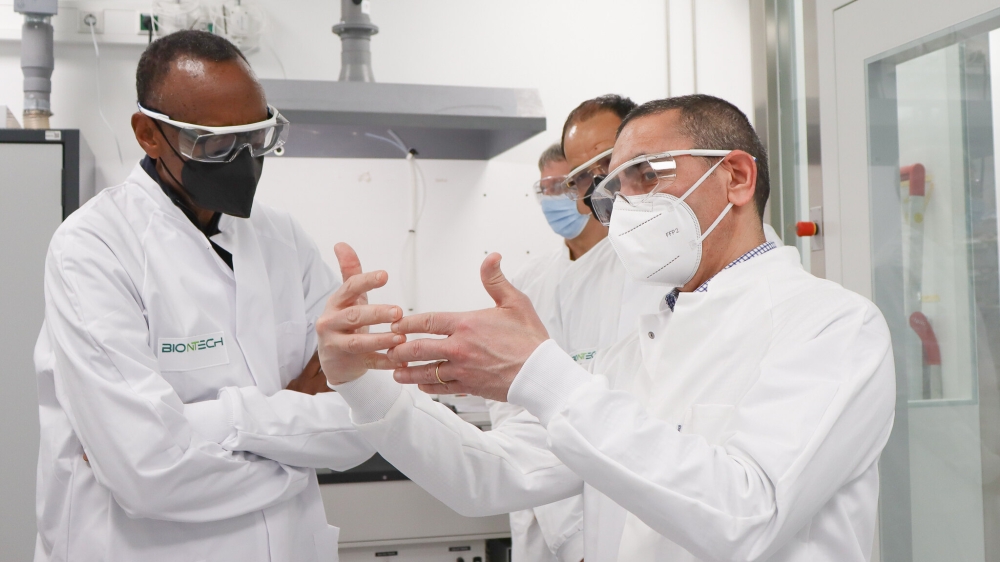

Covid-19 vaccine manufacturer BioNTech last week announced that it had secured a funding commitment of up to $145m (approximately Rwf188 billion) from the Coalition for Epidemic Preparedness Innovations (CEPI), in a bid to strengthen Africa’s mRNA vaccine ecosystem.
The Germany-based vaccine manufacturer said it would use the funds to set up mRNA vaccine research and development (R&D), and clinical and commercial-scale manufacturing capabilities at its existing facility in Kigali, Rwanda.
ALSO READ: BioNTech&039;s vaccine plant in Rwanda gets over Rwf180bn
These capacities are, among others, expected to be critical in enhancing readiness for potential future epidemic and pandemic challenges on the continent by building a sustainable and resilient end-to-end ecosystem.
The latest funding follows that of up to $90m that the coalition (CEPI) granted BioNTech in September last year to develop mpox vaccine candidates.
According to BioNTech, the partnership aims to back the company’s existing efforts in three key areas for Africa’s pandemic preparedness and vaccine ecosystem;
Commercial-scale manufacturing
Information obtained from BioNTech indicates that CEPI’s funding will support measures required for the regulatory authorisation of its facility in Rwanda, starting in 2025.
Inaugurated in December 2023, the 300,000 square meters facility is based on the company’s digitally enabled modular manufacturing units called BioNTainers, designed to manufacture a range of mRNA-based vaccines.


Under the terms of the agreement, in the event of a disease outbreak or a potential disease outbreak, BioNTech would dedicate up to half of the facility’s manufacturing capacity to produce emergency response mRNA vaccines, subject to regulatory authorisation.
This effort aims to, among others, contribute to the 100 Days Mission, a global initiative to accelerate the development of safe and effective vaccines in response to an outbreak of a novel Disease (X) in as little as 100 days.
The 100 Days Mission is spearheaded by CEPI and embraced by the G7, and G20, among other industry leaders.
End-to-end clinical-scale manufacturing of novel vaccine candidates
Most of the CEPI funding will be allocated to set up clinical-scale manufacturing capabilities for mRNA-based vaccine candidates at the Kigali facility. Details on what percentage of the total funding would be allocated were not available by press time.
This would allow the BioNTech facility to manufacture on both a clinical and commercial scale, thus broadening the manufacturing scope, and supporting a sustainable use for the facility while strengthening the wider African vaccine development ecosystem.
BioNTech says it is also separately proceeding with the development of prophylactic mRNA vaccines targeting infectious diseases such as tuberculosis, malaria, and HIV, and is also focusing on diseases with epidemic and pandemic potential, including mpox.
Clinical trials for tuberculosis, malaria, and mpox vaccine programs are underway in Europe, the United States, and South Africa.
BioNTech also aims to conduct clinical trials in Africa for vaccine candidates against malaria, HIV, and mpox.
Strengthening the African R&D ecosystem
The funding, BioNTech said, would enable the company to dedicate manufacturing capacities to third-party projects to support pre-clinical and clinical activities, including those by African-based researchers, academic groups, local businesses, public-private partnerships, and non-profit organisations.
Reacting to the eligibility criteria, BioNTech said the projects would be selected in partnership with global, regional, and national healthcare organisations.
"This effort by BioNTech and CEPI has the potential to enable R&D activities for novel mRNA-based vaccine candidates against pathogens with epidemic or pandemic potential,” a statement reads in part.


